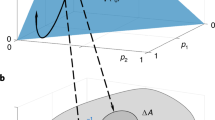Abstract
GERHARZ1 has recently proposed a new method for determining the velocity of light in terms of a standard frequency and of the wave-length of an atomic radiation. He expects to reduce his experimental errors to less than 1 part in 108 and suggests that it should then be possible to obtain evidence about secular changes in the velocity of light. Dingle2, on the other hand, follows Clemence in arguing that if the unit of time is defined in terms of the frequency of some atomic transition and that of length in terms of the wave-length of an atomic radiation, then the velocity of light is implicitly constant, no evidence can be obtained of its changes relative to atomic constants, and the science of physics is restricted at its foundations. The conflict between these two statements shows that the meaning of such phrases as ‘secular changes in the velocity of light’ needs clarification.
This is a preview of subscription content, access via your institution
Access options
Subscribe to this journal
Receive 51 print issues and online access
$199.00 per year
only $3.90 per issue
Buy this article
- Purchase on Springer Link
- Instant access to full article PDF
Prices may be subject to local taxes which are calculated during checkout
Similar content being viewed by others
References
Gerharz, R., J. Electronics, 2, 416 (1957).
Dingle, H., The Observatory, 76, 239 (1956).
Author information
Authors and Affiliations
Rights and permissions
About this article
Cite this article
COOK, A. Secular Changes of the Units and Constants of Physics. Nature 180, 1194–1195 (1957). https://doi.org/10.1038/1801194b0
Issue Date:
DOI: https://doi.org/10.1038/1801194b0
Comments
By submitting a comment you agree to abide by our Terms and Community Guidelines. If you find something abusive or that does not comply with our terms or guidelines please flag it as inappropriate.


